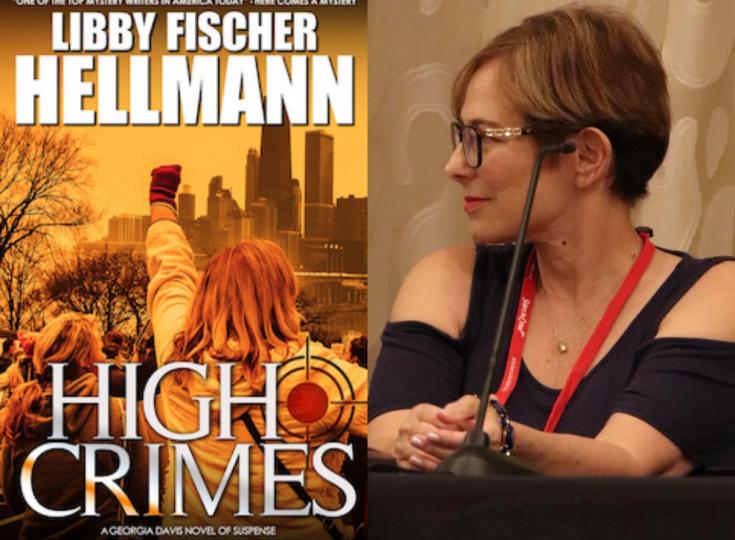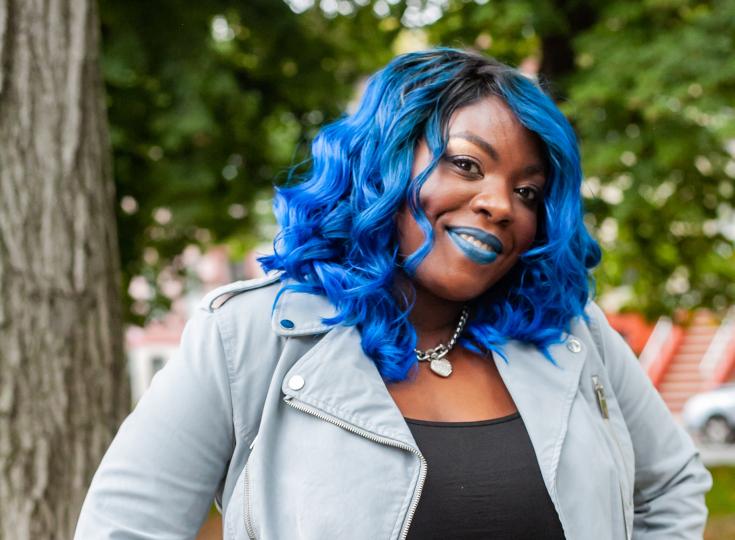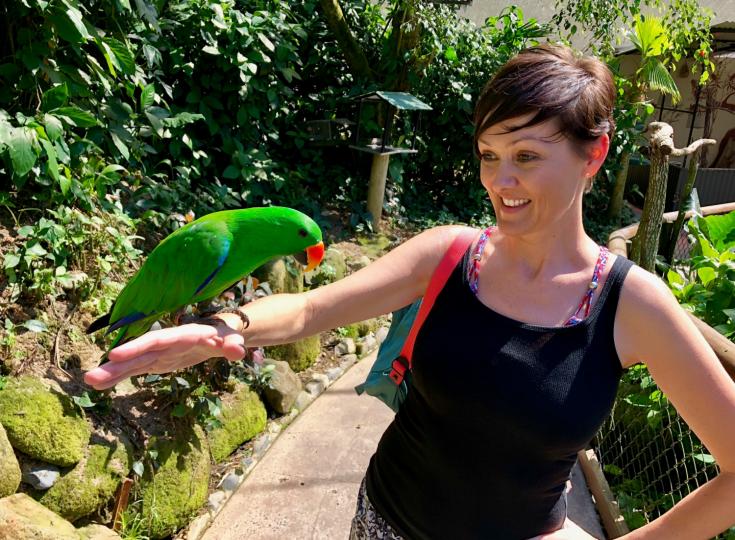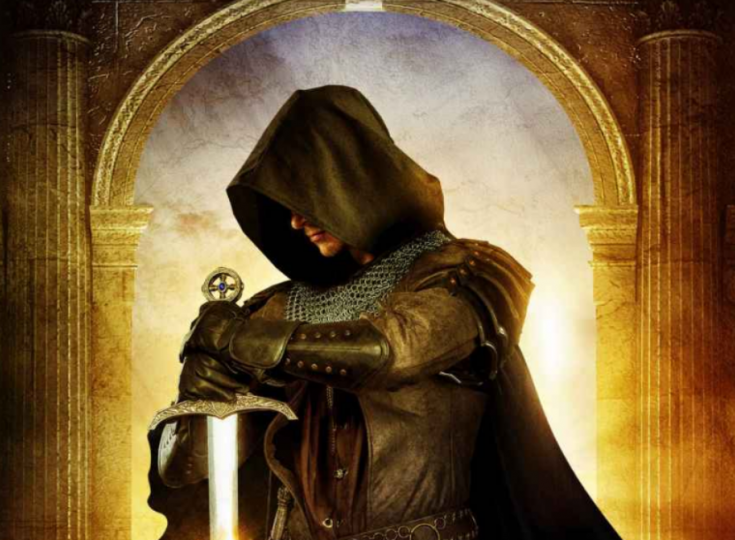Libby Fischer Hellmann - Writing Gritty Crime Fiction

Libby Fischer Hellmann left a career in broadcast news in Washington, DC and moved to Chicago over 35 years ago, where she, naturally, began to write gritty crime fiction. Fifteen novels and twenty-five short stories later, she claims they’ll take her out of the Windy City feet first. She has been nominated for many awards in the mystery and crime writing community and has even won a few. As our Author of the Day, Fischer Hellmann tells us all about her latest book, High Crimes.
Please give us a short introduction to what High Crimes is about.
How do you solve a murder when there are 42,000 suspects? That’s the task facing Chicago PI Georgia Davis, hired to hunt down those behind the assassination of Resistance leader Dena Baldwin at a demonstration fourteen months after the 2016 election.
Tell us more about Georgia Davis - what makes her tick?
Georgia is a loner. She has baggage. She doesn’t trust easily. When we meet her she is still a cop and in the middle of a love affair with a detective. Of course, that falls apart, as does her career, and she eventually becomes a PI. Through it all, though, she has a finely tuned sense of justice. She also has a predisposition toward protecting young girls, and she is a mentor in spite of herself. However, over the arc of five books now, she has slowly changed, and her life has become more complex and dependent on other people. I’m glad. It keeps her from being too hard on herself.
What inspired you to use a political assassination as the backstory for you book?
It was personal. By ten pm November 8, 2016, along with most of the world, I had traveled through the looking glass. How could this man have become our next president? It wasn't possible. But it was.
I felt paralyzed: I couldn't write, and I couldn't talk about anything else. I probably drove away many people who previously thought I was a nice person. For a year I let my rage control me. My refuge was a Facebook group, Investigation of the Trump-Russia Conspiracy in the 2016 Election. Suzy Fischer (no relation, by the way), to whom this book is dedicated, started the group about three days after the election. I joined the first week.
However, I came to realize that I had given the occupant of the Oval Office all my power, especially where my writing was concerned. I'd brainstormed two different novels during the fallow period, but they didn't resonate. Then came the eureka moment. I was reading posts on the Investigation site one day when I realized my next novel had been staring me in the face. I needed to write about the group, its leader, and the climate in which we Americans find ourselves.
Why did you decide to include a family crisis in this story?
Part of Georgia’s backstory is that her mother abandoned her when she was young. She’s been living with that profound sense of loss her entire life. I felt it was time for her to confront it directly – she’d had a hint of it when she discovered Vanna, her half-sister, in NOBODY’S CHILD. So I brought her mother into the story in HIGH CRIMES.
Critics describe your work as "meticulously researched". How do you go about researching your stories?
Ironically, I didn’t have to do much research for HIGH CRIMES. All I needed to do was keep up with the daily news cycle and pay attention. Typically, though, I do primary research by interviewing experts in the history, culture, or specialty that I’m writing about. I record them and take notes. I also go on field trips to the locations I’m using and take photos if I can. If not, I search out photos and videos online. I also read. Lots and lots of articles, books, biographies, and more. I list the books I’ve read when it’s appropriate. Sometimes films help. News stories are a godsend. In fact, Google is my friend. So are Google Earth and maps.
Besides writing, what other secret skills do you have?
Hmm.. that’s tough. I’m pretty good at choosing Netflix shows, and I’m an expert at ordering in. That’s enough for anyone, don’t you think?
Are any of the characters in the book based on real people?
Only one character in all my books is based on a real person. Susan Siler, who is featured in my Ellie Foreman mysteries, is based on Susan White, who was my closest friend. Unfortunately, she passed away from breast cancer about twelve years ago. I promised her kids then that she would always be alive in my fiction. One of these days, she might even have her own story.
What was your greatest challenge when writing this book?
The biggest challenge in writing HIGH CRIMES was keeping it credible. Specifically, the plot had to be plausible, and in this volatile period, possible. My characters too. It’s said that every villain is a hero in his own story, so I kept that in the front of my mind. They had to ring true. The other challenge was dealing with an inherently political situation that some people would not like. I tried to keep it even-handed. There are no heroes in this story, no matter what their politics, except Georgia.
How do you come up with such brilliant ideas for conflict? I mean, the way the plot goes is just never what you expected it to be, you never know what might happen next!
Great question. Conflict is the lifeblood of fiction, whether it’s large or small, ie, a character wanting a glass of water that he/she can’t have. Every scene I write has its own conflict, and that’s where I’m often surprised. Sometimes the characters have deep-seated opinions or values that I didn’t know about, and they emerge during times of conflict. In fact, when you put a character in conflict, some people become heroes. Others become cowards or villains. The fun part is that I never know which it’s going to be.
Do you ever suffer from writer’s block? If so, what do you do about it?
Absolutely. As I mentioned above, I couldn’t write for a year after the election. Once I’m into a book, though, there are often times when I don’t know what the next scene or chapter will be. When that happens, I just stop writing, and do things like make my bed or go to the grocery store. That helps “center” my brain, and more times than not, I’ll figure out where to go. It’s when I can’t figure it out that a warning bell goes off. It usually means that I’m headed in the wrong direction, or that the scene I think I want to write isn’t as credible or powerful as it should be. I’ve learned to heed those warning bells and regroup.
Where can our readers discover more of your work or interact with you?
My website, httP://libbyhellmann.com, is a good place to start to check out all my novels, novellas, and short stories. Or my Amazon page. I also have a Facebook Page but probably the best place is Twitter (@libbyhellmann). That’s where I hang out most of the time.





